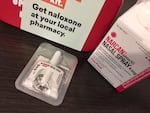Lawmakers in the Oregon House have overwhelmingly approved a bill to more widely distribute the life-saving medication that reverses overdoses from fentanyl and other opioids.
With overdose deaths in the state showing signs they might continue a steep years-long rise, House Bill 2395 passed by a vote of 48-9.

A bill making its way through the Oregon Legislature seeks to make overdose-reversal kits far more accessible in the state.
Kristian Foden-Vencil / OPB
The bill, an amalgamation of several proposals introduced in separate bills this year, attempts to address the surge in deaths in part by increasing access to naloxone, the overdose-reversal medication. Among its provisions, the bill:
- offers the opportunity for overdose-reversal kits to be made available in libraries, churches, and other buildings open to the general public — and allows the Oregon Health Authority to purchase the drug in bulk in order to help that happen
- allows law enforcement agencies, firefighters and emergency medical technicians to distribute naloxone kits to drug users, family members of users and others likely to encounter a person who is overdosing on opioids.
- allows teachers or other educators to administer naloxone to a student who is overdosing, granting criminal and civil immunity if they do so.
- decriminalizes testing equipment meant to detect the presence of fentanyl
- allows minors to receive outpatient treatment for addiction without parental consent
The package was spearheaded by state Rep. Maxine Dexter, a Portland Democrat and critical care physician who said she frequently uses naloxone to revive patients while at work.
“When you have seen someone come back from being dead by giving this medication, you don’t forget how incredible it is,” Dexter said. “It is one of the first things we use because it is safe to give, works well if the person has opioids in their system and cannot hurt the patient.”
Given that safety, Dexter says has joined officials around the country who are calling on the drug — also known as Narcan, a patented nasal spray version — to be made far more available to the general public.
She found plenty of agreement on Monday.
Republicans and Democrats have clashed on drug policy at times this legislative session, with many GOP members calling on their colleagues to repeal aspects of Measure 110, the 2020 ballot measure that decriminalized low-level drug possession. Democrats, who hold majorities in both chambers, have declined to take those proposals seriously.
But the far reach of the opioid crisis in Oregon has impacted members of both parties. According to the Oregon Health Authority, unintentional overdoses from opioids have exploded alongside the increasing availability of fentanyl — from 280 in 2019 to 745 in 2021. Last year’s numbers have not been finalized, but the OHA has noted that the number of overdose-related visits to emergency rooms and urgent care centers rose over previous years.
State Rep. James Hieb, R-Canby, lost his little brother to a fentanyl overdose in 2014.
“This brought so much grief that ultimately more deaths followed in our family,” Hieb said on the House floor. “Naloxone could have potentially saved my brother.”
State Rep. Ed Diehl, R-Scio, had both a cousin and a close family friend who died from fentanyl.
“I can’t help but think that maybe if they’d been with someone with naloxone they would be alive today,” he said.
Diehl also shared the story of Courage Minten, a young man in his district, who died last year after taking a counterfeit pill that was laced with fentanyl. His family had encouraged Diehl to share the story, he said.
“Fentanyl is not just killing frequent drug users,” Diehl said. “Sometimes it’s kids who simply make one bad decision and pay for it with their lives.”
Democrats agreed. State Rep. Travis Nelson, a nurse from Portland, said that while increased use of naloxone is not a “silver bullet” for the state’s addiction crisis, “we can save countless people by providing greater access.”
HB 2395 did face skepticism — even from lawmakers who professed that it could lead to positive change. Some Republican members balked at the idea of increasing access to naloxone without also taking steps to crack down on drug use.
Just using a harm reduction model — that is, an approach to limit the harm caused by drug use — amounted to “a surrender to addiction,” state Rep. Christine Goodwin, R-Canyonville said.
State Rep. Werner Reschke, R-Klamath Falls, said he would vote no “to put a flag down to show this body we also need to focus on hard prevention” of drug use.
In the end, though, the opposition was muted. HB 2395 now moves to the Senate.
